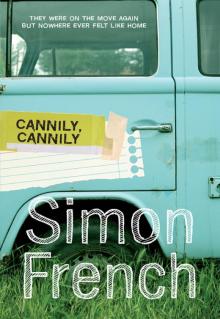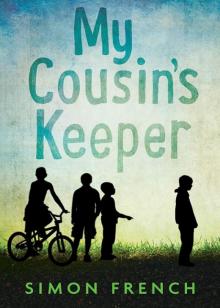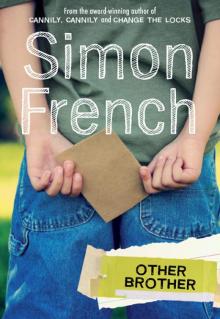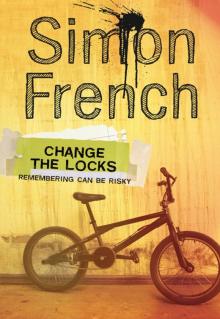- Home
- Simon French
Other Brother
Other Brother Read online
Contents
Cover
Blurb
Logo
Chapter 1
Chapter 2
Chapter 3
Chapter 4
Chapter 5
Chapter 6
Chapter 7
Chapter 8
Chapter 9
Chapter 10
Chapter 11
Chapter 12
Chapter 13
Chapter 14
Chapter 15
Chapter 16
Chapter 17
Chapter 18
Chapter 19
Chapter 20
About The Author
Copyright
Dedication
Other Books by Simon French
Bon raised his hand as if to say hello to me, but I turned quickly away. I didn’t want anyone to know that we knew each other, much less that we were related.
Kieran wants to be part of the cool group at school. He wants to be on the football team. He wants to fit in. But his cousin Bon is different. Different from any kid Kieran has ever met. And he’s ruining things for him. Why can’t Bon just go away?
“Another finely crafted book from Simon French who understands boys of eleven and tells their stories with effortless fluency.” ERNIE TUCKER
CHAPTER 1
We’re brothers, we are.
That’s what he had said. Suddenly, his arm was around my shoulder as we kneeled together on my bedroom floor, surrounded by most of my toys. He had looked up at my mum as she held her camera to take the photo, and that’s exactly what came out of his mouth when the camera flash went off. In the photo, he was smiling, although his eyes didn’t seem to. In the photo, my mouth was open and I looked a little surprised.
In truth, I remembered being angry. This boy, who I didn’t know, had snuck away from everybody else in our backyard and found my bedroom. He had found all my toys as well, and by the time I discovered him, nearly everything I liked and played with was spread across my bedroom.
“This is my room,” I had told him. “Leave my things alone!” And I had kneeled down to start gathering up my favourite things. Mum had appeared at the doorway at that moment and taken the photo, not realising how annoyed I was.
Afterwards, I had shaken the boy’s arm away from my shoulder and said in amazement, “I’m not your brother. I don’t even know you.”
“You should have asked Kieran first,” Mum told the boy gently. “This is Kieran’s room, and these are his things.” And to me, she added, “Is there something you’re happy for him to play with, Kieran?” Then she reminded me who this stranger was. It was Bon, my cousin. “He’s our guest, and I want you to look after him a little,” Mum instructed.
But I didn’t want him in my room, and I didn’t want to be anywhere near him. He had said something completely strange and untrue. He had even hugged me. Bon was nearly the same age as me, I already knew that. For a moment I studied his face to see if there was any kind of resemblance. “I don’t want you in here. Go away,” I muttered.
Bon looked at me blankly, as though I had spoken another language. Up close, he smelled a little of sweat and wee. His shirt was faded and coming apart at the edges, and his socks showed through the torn tips of his sneakers. His hair was longer than mine, and tied back into a blond ponytail. He wasn’t the sort of cousin I had expected, and I didn’t know why he and his mum had suddenly turned up at my dad’s birthday barbecue. And Mum was surprised to see her older sister after so many years.
Later in the evening, after lots of people had left and it was mostly Dad’s soccer mates gathered around the last of the beer and food, Mum said to me, “Kieran, you know that was probably the most toys your cousin had ever laid eyes on in his life.”
“I don’t care,” I grumbled. “He just came in and touched everything without asking. He wasn’t even invited in the first place.”
“It wasn’t his fault,” Mum answered. “None of us had any idea Bon and Renee would show up.”
Dad’s birthday barbecue had begun in the usual way. Nan had been at our house and in the kitchen almost straight after breakfast, helping Mum prepare party snacks and salads. After midday, the neighbours strolled in from next door, and then our friends from around town with their kids. A couple of Dad’s work mates from Rural Engineering arrived together, and as our backyard began to crowd out, the talk and laughter grew louder and louder. A lot of us kids climbed through the wire strands of the back fence to play games on the strip of grassy paddock that ran along behind the houses in our street, except for some of the little girls who stayed in the backyard to play with my sister, Gina.
When most of Dad’s soccer team arrived, the noise got even louder. The season wasn’t due to start for another fortnight, so a long afternoon and a late night wasn’t going to affect a weekend game. As cooking smells from the barbecue began to drift across to where we played in the back paddock, the team sang Dad a funny and rude birthday song. Even Nan laughed.
And then someone else arrived. I couldn’t remember Aunty Renee, but at first I wanted to like her. She was so unlike Mum, a different shape and size, with a louder way of speaking. She dressed differently from Mum too: in a leather jacket, jeans and black buckled boots. The man she had brought with her was dressed much the same. I didn’t take a lot of notice of Bon, because I was more interested in my aunt’s jacket and the tattoo I could see peeking out from under her sleeve. Mum and Nan walked over to say hello and give my aunt a kiss, but Mum’s voice sounded a bit awkward as she did some introductions to the people nearest.
“We were just travelling through,” my aunt said. “If we’d known there was a birthday happening, we would have brought something.”
“Good to see you again, Renee,” my nan said, not sounding as though she meant it. “It’s been a while.” Already I had seen her lean over to kiss Bon, and now she held him close, hugging him so that for a few moments at least, he was unable to move.
“God, this one’s grown,” my aunt remarked, pointing at me. “Kieran, isn’t it? Last time I saw him he was just about still in nappies.”
“Bon’s grown up a lot, too,” Mum answered. “It’s been far too long since we’ve seen you both.” But my aunt was already busy showering attention on Gina and saying how pretty she looked. I knew it was the first time she had ever seen my little sister.
I had heard Aunty Renee talked about, mostly when adults thought I hadn’t been listening. She was my mum’s older sister, quite a bit older, and I remembered that some of the Christmas cards Mum had mailed her had come back with a “Return to Sender” stamp on them. My aunt seemed to move house a lot.
I asked Mum quietly if the man my aunt had brought along to Dad’s birthday was my uncle. “No, definitely not!” she told me.
Nan had a photo of Bon, just the one. It was a baby photo, kept on her fridge door, in a colourful magnetic frame. I’d often looked at that photo and wondered about the cousin I didn’t know.
Bon hadn’t followed us kids back out to the paddock after we’d come in to raid the food. He poked around our backyard and seemed a bit lost at first, but then went and stood with Gina and her little friends. When I saw him next, he was over at the food table, busily eating handfuls of chips, crackers and dips. He spent quite a bit of time doing this, and I wondered if he was being greedy or was just really hungry.
Then I heard my aunt’s voice. “Are you listening to me?” It was unexpectedly loud and angry, and I looked over in time to see her with one hand clenched around Bon’s face. Her fingers pressed tightly into his cheeks so that his mouth opened a little.
Aunty Renee looked furious. “I told you to behave,” she said through clenched teeth. All our guests stopped talking for a moment, and some of them looked
a bit shocked. But Bon looked away from his mother as though nothing had happened. I expected him to rub his sore face, or even to cry. Instead, he gazed into space, as his shoulders and arms flopped around a little, before his mother let go of him. He said nothing.
Nan walked over and did say something, but my aunt replied, “No, don’t tell me what to do. He’s my kid.”
Nan looked anxiously at Bon, then reached over and ran her hand gently across his shoulder. My aunt glared. Gradually, uncomfortably, people began to talk again, until the party found its noise and laughter once more. When I looked next, I could see Bon walking through the back door and into our house, not knowing at that moment he had been on his way to my bedroom and my toys.
We’re brothers, we are.
“He said that weird thing, too,” I reminded Mum.
“He’s probably quite lonely,” she replied. “And, quite likely, he was excited about meeting his cousins properly.” Mum paused. “Thank you for letting him play with some of your things.”
“I didn’t want him to,” I said. “It wasn’t like he asked first.” I paused and frowned. “Will they visit us again?”
Mum answered quietly. “I hope so, for Bon’s sake. As for Renee …”
Another uncomfortable thought came back to me. “She hurt him.” I had never seen an adult do that before. Sometimes down at the shops I had heard other parents yell at their kids or smack them on the hand, especially some of the teenagers who pushed prams or led little processions of toddlers. “She was hurting him,” I said again, trying to make sense of it. “His face –”
“I’m sorry you saw that,” Mum said. “He wasn’t being naughty; he was probably just plain hungry.”
My aunt had not stayed long at our party, either. I remembered that.
“Time for us to get back on the road,” the boyfriend said, after Dad had blown the candles out on his chocolate mud cake. The goodbyes were brief, and the three of them left almost as unexpectedly as they had arrived. I had walked with Nan and my parents to the driveway gate to see them off, to watch the boyfriend’s big black ute take them to the end of our street and then away out of town. They had sat in the single front seat together, but my cousin, jammed in the middle, was the only one who turned and looked back. He didn’t wave, he simply stared at us through the window, all the way to the corner. It was as though he had wanted to stay behind. I was glad he hadn’t. Then I happened to look at Nan waving, her face looking as sad as I thought I’d ever seen it. “That poor child,” she had said, her voice soft and defeated.
Later, when I began to tidy my room, I noticed that my medieval castle had been moved. Its army of horses and knights was set out in formation across the carpet, the royal family and their wizard on the castle parapets, standing close as though talking to each other. The castle had been a birthday gift only months before, and I was furious that it had been touched and rearranged. And then, as I frowned and muttered to myself, I discovered that two things were missing – a white horse and an armoured knight, the one who carried a sword in one hand and a blue crested flag in the other. And I knew straightaway who had stolen them and how far away they must be by now.
This was mostly how I remembered my dad’s birthday party, the year he had turned thirty-five, and the year I turned nine.
It would be two years before I saw my cousin Bon again.
CHAPTER 2
“Come on!” Dad called back to me. He was already halfway up the steep short hill that was Guthrie Street, his regular challenge. The way he called it back to me sounded more like “C’marrnn!”, his voice heaving with the effort of his running, but also the effort of not trying to wake up everyone in the street. It was early, some time between six-thirty and seven, and this was the only thing he had said to me since we’d left home. I wanted to tell myself that it was friendly encouragement, but really I sensed he was a bit irritated at how I struggled to keep up.
C’marrnn! I could hear those two words, stretched and slurred into one by kids and grown-ups alike, called from the sidelines of my dad’s weekend games. Saturday after Saturday, we cheered and yelled as the Locomotives fought and won match points, as Dad showed his speed and skill at striking the ball into the goal. He was a fast runner, a good aimer and kicker. I was not.
But I wanted to be. I wanted to show Dad – and his noisy teammates and the kids at school – that I could do these things well. I wasn’t sure what else I was particularly good at doing.
It was early in the soccer season. The day was light and the sun was already peeking above the mountains at the eastern edge of town. By mid-season, it would still be dark at this time of the morning and all the streetlights would still be glowing white or orange above the shops, houses and the park.
If I woke early enough and got my clothes and joggers on quickly, I’d catch up with Dad at the front gate or perhaps a little way along our street as he began his training run. Just as often though, he’d go without me. It always surprised me that a week’s hard work in the big shed at Rural Engineering was never enough for Dad to reward himself with a weekend sleep-in. Early each evening, he’d leave his pushbike under the carport and walk inside, hands and clothes grimy with steel dust and oil stains. And he’d be out the next morning, jogging the streets around town, no matter how dark or cold, windy and wet it might be. Even when soccer season finished, he would still be out running two or three times a week. But I’d get lazy and today, after a long burning summer and the beginnings of autumn, I was paying for missing weeks of morning runs.
Three steep streets in a row turned off Sheridan Street, just near the point where the houses stopped and the shops more or less began. More or less, because our town had once been a bigger, busier place and there were buildings that used to be shops, but which now stood empty. Sometimes I felt curious to know what might still be inside, behind the boarded-over windows, or behind old blinds and shutters.
“Come on!” Dad called once more, his voice clear and encouraging against the early morning quiet. He was nearly at the top of the hill and I had barely begun. Guthrie was the steepest of the three streets. Fraser and Raymond were a little easier, but only just.
Today, the air was milky with fog. I could feel my face wet and cold with vapour. With all the effort and concentration I could muster, I launched myself at Guthrie Street’s tar surface and heaved my way to the top, taking short jogging steps and keeping my eyes on my feet. I knew if I stopped halfway, that the second part of the climb would feel a lot worse. Dad waited at the top, hands on his hips. Perspiration spotted his forehead and streaked down his cheeks into his beard whiskers. “Now, wasn’t that fun?” He grinned. “Let’s do it again!”
I dropped my mouth open to say something, but was too out of breath.
“Actually, a good place to stop for a moment,” he murmured beside me, and it was true. This was the highest point in town, and you could see nearly every house and backyard. The streets straggled down to the main street and then the riverbed, the dividing line between shops and houses, between paddocks and the highway to the west. I could see the silver and red shed roof of Rural Engineering, where Dad worked. After a shower and a change of clothes, he would be cycling away for a day of cutting, welding, repairing and restoring.
The sun had climbed a tiny bit higher above the mountain range and I let its warmth settle on my face.
“Beautiful view,” he said. “I never get tired of it.”
I’d heard him say this many times as we’d stood in this very spot, and sometimes thought I could see a look in his eyes that meant he was thinking of somewhere else altogether. Because this wasn’t Dad’s home town; he had come here from a bigger country town for a job he’d wanted. “Then I met your mum,” he’d often say with a smile, “and the rest is history.”
The view reminded me of a few things that I had learned about living here – how in summer, the heat turned the school playground to dust; that the winters could be numbingly cold; and that whenever it rained heavil
y, the street gutters quickly overflowed and had the roar of waterfalls.
Dad squished and rubbed a handful of my hair. He wasn’t gentle. “You sound all puffed out. Thought I was out of shape …”
“This street’s got the toughest hill,” I reminded him. “We should have started with Raymond Street and worked our way up.”
“Well, I started with Raymond Street last week.” He smiled. “One of the days you slept in, kiddo. You want to play in a team, then you’ve got to put in the training time. Hmm? No use being a bed zombie or a couch potato.”
He’d used that phrase on me before, and now ignored my shrugged shoulders, my wondering if sport was something I might only ever be average at.
“Come on,” Dad said at last. “We’ve done the tough uphill bit. Let’s go downhill.”
After the hill peak, Guthrie Street curved away and down to the old railway station. No trains had run to our town for years, and there was only a museum of photos and models inside to show what a busy and important place it had once been. A couple of old restored carriages sat in the siding beside the empty platform, but at a short distance from the station, the rail lines disappeared under dirt and grass. I could keep up with Dad on the flat ground and it was a little easier now, knowing as well that we were past the halfway mark and more or less heading for home again.
We came to the very eastern end of the main street, the point where the railway line had once led onto the old bridge and away to other towns and eventually, the city. The bridge was timber and had grown wobbly with age, too unsafe to walk on these days. A fence ran across at the footpath where the bridge began. Sometimes this was another of Dad’s stopping places, but not today. As my stomach and legs began to hurt even more with the effort, he gradually got further and further ahead of me. Once or twice he turned to check that I was still somewhere behind him. He raised one hand in a wave, and so did I as I slowed to a walk. We would meet up at home.
The very first time we had ever run together, I had been so excited about being allowed along that I’d spent the first ten minutes telling him everything I knew about everywhere and everybody in town.

 Cannily, Cannily
Cannily, Cannily My Cousin's Keeper
My Cousin's Keeper Other Brother
Other Brother Change the Locks
Change the Locks